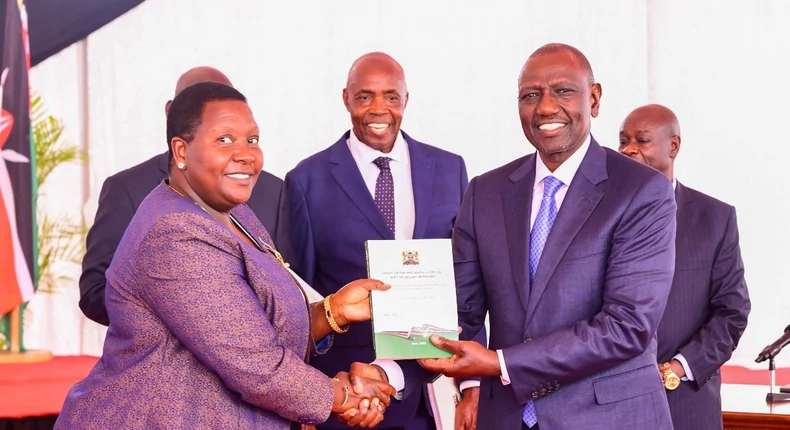President William Ruto yesterday unveiled the plan to reform the Kenyan Education System during the signing of Perfomance Contracts at State House in Nairobi.
The Presidential Working Party on Education Reform (PWPER), is a report giving recommendations on the changes to be made on the new education system, Competence – Based Curriculum (CBC), so as to reduce the number of learning areas in the in curriculum.
The PWPER was appointed in September last year and travelled around the country to gather views from the public. Chaired by Professor Raphael Munavu, the task is complete and it only needs to go through parliament for implementation.
President Ruto said he was proud of the report and said if implemented, the report will shake up the entire education system from the ground up.
“I will lead the team that will ensure that the recommendations are implemented for the benefit of children and society.” Dr. Ruto said.
According to the report, Primary and Junior Secondary learners will bear a lighter burden for the team has proposed to reduce the number of learning areas as CBC gains momentum.
The report shows that the new reforms are meant to avoid curriculum overlap and reduce the cost of updating the CBC system passed on to parents. It says that internet and electricity connectivity negatively affect digital literacy and low levels of literacy and numeracy for basic learning.
PWPER now recommends the Kenya Institute of Curriculum Development (KICD) to reduce the number of learning areas from nine to seven from Grades One to Three, from 12 to eight for Grades Four to Six and from 14 to nine for Grades Seven to Nine.
The number of learning areas will be five in pre-primary and seven in Junior Secondary School (Grades seven to 12). The report also recommends a comprehensive school comprising of pre-primary, primary and Junior Secondary in one campus and be managed as one institution.
The term ‘secondary’ will be dropped from Junior Secondary and Senior Secondary. The report also recommends the abolition of classification of schools as national, extra-county, county or sub-county.
It recommends reclassification of schools as day, boarding, mixed(day/boarding), mixed(boys/girls) and according to pathways they will offer at the Senior Secondary level.
The report says there should be a mandatory three-month community service programme for senior school graduates before entering tertiary institutions and a further nine months of mandatory community service upon completion of tertiary education.
In regards to the community service program, the report says a certificate of completion of community service should be issued as a proof of completion before admission to the world of work.
The report suggests that the Ministry of Education (MoE) develops a policy framework on dress code for all levels of education.
On matters teacher qualifications, the report suggests that MoE should provide guidelines for all teachers who graduated before 2023 to undergo one-year retooling and upgrading programme.
“Given the gradual implementation of the CBC, the MoE and sector stakeholders need to prioritize the retooling of teachers in line with the new requirements of the CBC and the learning/subject areas,” the report says.
Teacher training, which was previously the responsibility of the Teachers Service Commission (TSC), has now been transferred to the MoE, which significantly reduces the powers of the TSC.
Universities are expected to develop one-year retraining programmes for teachers in preparation for competency-based teacher education programmes.
PWPER has also recommended an increase in funding for education and many more other recommendations on reforming the education sector.
By Matildah Obaigwa














Comment here